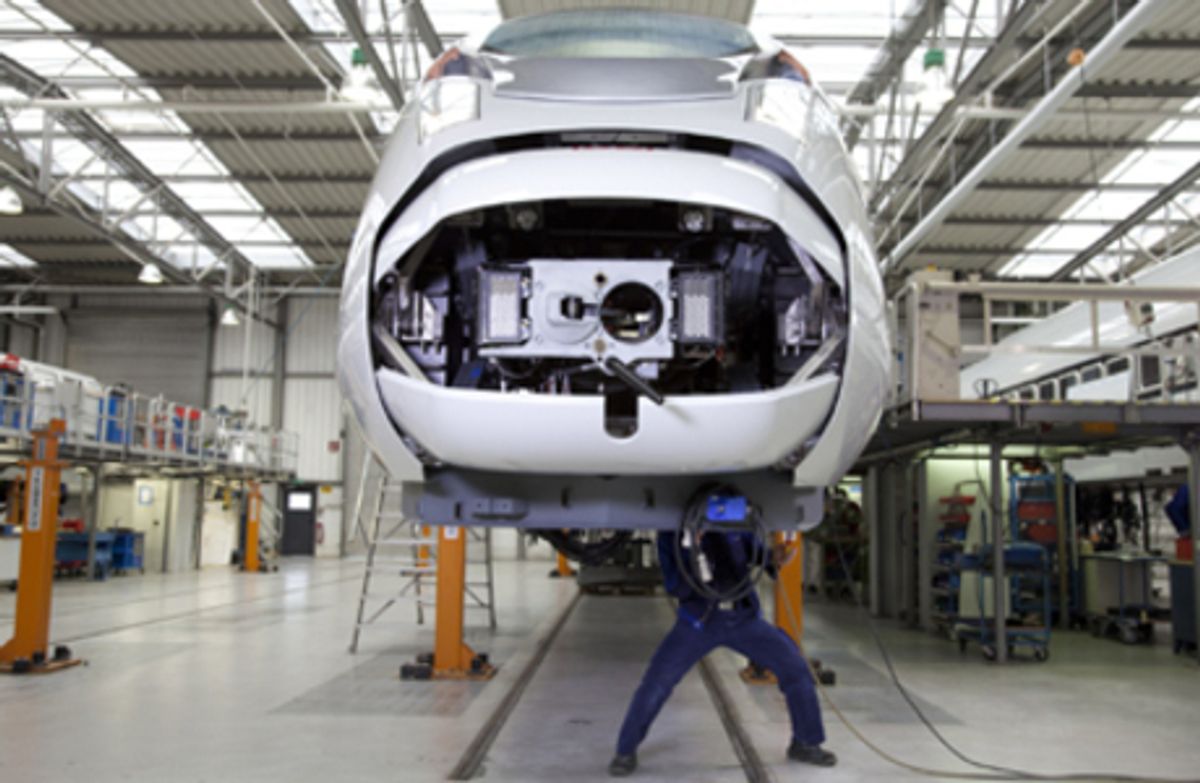Except for bicycles, mass transit is the greenest of transportation technologies. Experts may quibble about whether electric and hybrid-electric vehicles yield net energy and carbon savings, but there's no doubt that to the extent travellers can be lured from cars onto trains, substantial efficiencies result. As for air travel, greenhouse gas emissions are so great some green-minded indviduals try to avoid it altogether.
So, as emerging economies like China build out their railway systems while advanced industrial countries intensify efforts to make commuter raid more attractive, provision of advanced fast trains is a highly competitive business. It's been dominated in recent years by Bombardier, the commuter plane and train maker based in Montreal; Alstom, make of France's famed Train a Grande Vittesse (the TGV); the intercity expresses (ICEs) made by Germany's Siemens; and Hitachi, manufacturer of Japan's Shinkansen bullet trains.
Bombardier, having assembled and created manufacturing operations around the world, has emerged in recent years as world's leading trainmaker. The United States, havlng sorely neglected investment in infrastructure and green technology, may have some influence in fast trains as a consumer, but as a technology developer it's been nowhere. Easily the most influential consumer is China--and it's been leveraging that influence to acquire advanced technology. As a result it may be in a position to challenge the top four manufacturers before this decade is out.
The global significance of green-oriented infrastructure technology is not to be underestimated. Ask yourself why China is a major preoccupation and problem for the United States but much more an opportunity for a country like Germany, and the main part of the answer is bound to be Germany's strength in infrastructural engineering--power plants, train equipment, industrial machinery. The U.S. trade deficit with China was $269 billion in 2008 , with exports just a fifth of imports; but Germany's China deficit was only $25 billion, with exports two thirds of imports.
With an eye on that kind of situation, at present the main fast train makers are all developing still greater versions of their current systems. Bombardier's next train is the Zefiro (pictured in the photo in the table of contents). Siemens has dubbed its the Valero-D (pictured above). Alstom's is the AGV (Automotrice a Grande Vitesse). Hitachi, not to be left out of account, has been developing a bullet train with redesigned heavy-duty bogies at a factory in Kent, with Britain's commuter raid networks in mind. Both Alstom and Bombardier have won major orders in Italy, and both companies with Siemens have been involved in helping China build the remarkable high-speed link that now connects Guangzhou with Wuhan. (Guanzhou, near Hong Kong, was formerly known in the West as Canton; Wuhan, on the Yangtze River, is midway between Guangzhou and Beijing.
But the China market has come at a price. True to its customary operating procedure, it has exacted co-production and technology-transfer agreements as part of its big train purchase deals. As a result, the Financial Times concluded in a recent special report, "the [rail] industry universally expects a large-scale effort by Chinese manufacturers to break into many of the world's most important markets." Until recently, the FT continued, the European manufacturers confidently expected to dominate provisioning of the 40,000 kilometers of dedicated high-speed lines that China plans to build by 2020; few thought that China was close to mastering their technology.
It won't be the first time that China has stunned the world with the speed with which its people are able to get on top of advanced engineering. To be sure, Alstom, Bombardier, Siemens, and Hitachi are confident of their ability to stay ahead with the very most advanced trains. But when contracts are let for the fast train lines planned for the United States, with encouragement from stimulus bill funding, the Chinese Ministry of Railways--having concluded a memorandum of understanding with General Electric--es expected to be among the bidders.



